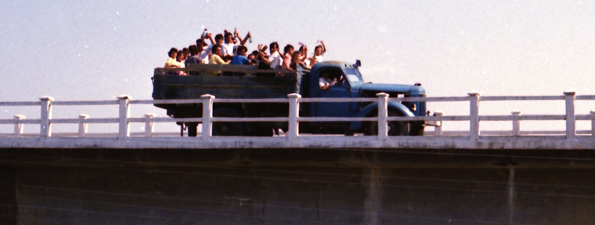
Beyond Comfort Zones
Addressing a gathering of missionaries engaged in Albania last weekend, I was reminded of the enormous changes experienced by that country since the overthrow of communism in 1991.
I first visited the nation Paul the Apostle knew as Illyricum (Romans 15:19) in 1992. Few cars drove on the ill-kept roads. The countryside was dotted with concrete mushroom-shaped air-raid shelters built under the paranoid reign of dictator Enver Hoxha.
Today Albania is a full member of NATO and since 2014 has been an official candidate for full accession to the EU, pending issues of justice, rule of law, minority rights and environment.
How impossible it seemed that Albania could ever change, even as late as 1988 when I was asked to take on the leadership of YWAM in Europe. The following year, 1989, amazing things began to happen: the barbed wire was rolled up on the Hungarian-Austrian border, the Berlin Wall was pulled down, and Romania’s dictator Nicolae Ceaușescu was dead and buried by the end of the year.
Student protests early in 1990 began a long and messy process of dismantling communist rule and towards a democratic system of government with separation of powers and protection of fundamental human rights. The incentive to join the EU continues to bring steady change and improvement in the lives of Albanians.
Revisiting this story last Saturday made me freshly aware of how much missions work in Albania and other former communist countries could not simply be limited to evangelism and church planting. It meant bringing good news into every sphere of a society so distorted by godless government.
Missions led to nation-building and often took us outside of our comfort zones, limited to thinking of ‘saving souls’ and planting churches.
Essential as these tasks were, we were forced into concrete involvement reshaping aspects of education, agriculture, government and other life spheres. The town of Pogradec became a laboratory for several ministries offering concrete help in these spheres. A potato-growing project, for example, led by a young Dutchman named Joost brought hope to the local region that there would be a future for the young people, prompting villagers to chant: ‘Joostie for president!’
I had been asked to speak on Saturday about the shape of missions in Europe today, a continent that once was the nursery of world Christianity, but which itself had become a most challenging and strategic mission field. What hope was there for the continent that had been fundamentally shaped by the gospel but, paradoxically, also by its rejection? How should we view Europe today? I suggested we needed to look in seven different directions.
We needed to:
Look back: We should be aware of how the Bible and the story of Jesus have been the most influential shapers of Europe’s past. To have faith for God’s future purposes we need to understand how God has been active throughout history, especially working through faithful minorities.
Look beyond: We also need wide-angle-lens vision to view Europe beyond our nationalistic and denominationalistic perspectives. Mission in Albania had forced missions to cooperate and think of the whole body of Christ, and the transformation of the whole of society.
Look forward: If the story of Jesus was the most influential shaper of Europe’s past, why should that not also be true of the future? We should ask ourselves, ‘what sort of Europe would please God?’
Look around: Europe today is still experiencing crises in economics, politics, society, religion and environment. Crisis has become the new norm for Europe. It should reshape the missions agenda of the European churches. The soft powers of love, truth and justice won the early church credibility and respect, and eventually conquered the Roman empire. They could win credibility for the church again.
Look within: If we’re really honest, we often feel intimidated, immobilised, unable to articulate our faith in the public square. Our lives are often church-centred rather than kingdom-centred, as we seek the comfort zone of fellowship with like-minded believers. A transformed Europe however will begin with transformed disciples, a transformed Body of Christ.
Look again: Take another look at Europe to see what God is up to. ‘Wheat and tares’ will always grow up together. Renewed spiritual hunger, new stirrings of prayer, fresh expressions of church, migrant churches restoring faith, colour and boldness in our cities, new ecumenism of the heart between ancient traditions and a recovery of awareness of the gospel as embracing all spheres of life are signs of hope in our continent today.
Lastly, look up: Our hope is never based on circumstances. As people of hope, pregnant with God’s future, we look expectantly past today’s crises to see how the Lord of history will fulfill His purposes for Europe and the wider world.
Jeff Fountain
Director Schuman Centre
For more articles from Jeff, visit weeklyword.eu

This Post Has 0 Comments